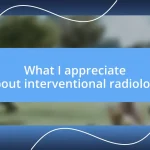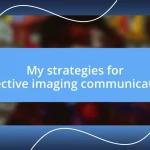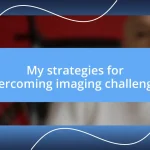Key takeaways:
- Networking is essential for professional growth, emphasizing the value of building relationships over merely exchanging contacts.
- Setting clear networking goals enhances the experience, making it easier to focus on meaningful connections, such as seeking mentorship or collaboration.
- Consistent follow-up and engagement are crucial for maintaining relationships, turning initial meetings into lasting professional bonds.

Understand the importance of networking
Networking is often talked about, but have you ever paused to think just how vital it truly is? In my experience, my strongest professional opportunities arose from connections I forged, not just from skills on my resume. Those casual conversations at industry events can lead to collaborations I never thought possible.
I remember attending a conference where I struck up a conversation with someone over coffee. A simple exchange turned into discussing potential projects, and that one connection led to a solid partnership. Isn’t it fascinating how a single interaction can shift the trajectory of your career? This just shows that networking is not merely about exchanging business cards; it’s about cultivating relationships that can enrich your professional journey.
Consider this: every person you meet has a wealth of knowledge and experiences. When you engage with others, you learn from their successes and challenges. Have you ever tapped into someone’s perspective and realized it changed how you approached your work? That’s the beauty of networking; it’s a continuous cycle of learning, sharing, and growing together in this vast industry landscape.

Identify your networking goals
Identifying your networking goals is crucial for building meaningful connections. It’s not enough to enter a room full of professionals; you need to understand what you aim to achieve. For instance, I once set out to meet three industry leaders at a trade show. Having clear objectives helped me stay focused and resulted in invaluable conversations that expanded my perspective.
As I reflect on my journey, I’ve realized that goal setting transforms networking from a daunting task into a rewarding experience. I remember when I decided to find a mentor rather than simply collect contacts. That choice led me to someone who not only guided my career but also introduced me to opportunities I never considered. Isn’t it interesting how specifying what you want can make all the difference?
Here’s a simple way to categorize your networking goals:
| Networking Goal Type | Description |
|---|---|
| Mentorship | Seeking guidance from experienced professionals |
| Collaboration | Establishing partnerships for projects or ideas |
| Learning | Gaining insights or skills from peers |

Choose the right networking events
Selecting the right networking events plays a fundamental role in the connections you develop. I’ve learned that not all events cater to my interests or industry focus. For example, I once attended a large networking gala that was eye-catching but lacked depth in terms of relevant participants. I felt out of place, which reinforced my belief that choosing events aligned with your professional goals can make all the difference.
When evaluating potential events, consider these factors:
- Relevance: Does the event focus on your specific industry or area of expertise?
- Audience: Who will be attending? Are they the type of professionals you want to connect with?
- Format: Is the event structured for meaningful engagement, like workshops or roundtable discussions, or is it simply a social mixer?
I also find that smaller, more intimate gatherings can lead to deeper conversations. Attending a workshop on emerging technologies, for instance, allowed me to connect with like-minded individuals and exchange ideas that sparked lasting collaborations. Those relationships proved invaluable as we navigated the challenges of an evolving industry together.

Develop effective communication skills
Effective communication skills are the backbone of building strong networks. I remember a time when I was at a panel discussion and had the chance to engage with a speaker afterward. Instead of simply complimenting their insights, I asked about their experience with a particular challenge. This open-ended question led to a rich dialogue that deepened our connection beyond the surface level. Have you ever noticed how a thoughtful question can transform a fleeting encounter into something more meaningful?
Listening is just as important as speaking, if not more so. I’ve often found that when I genuinely listen, I connect with the speaker’s emotions and ideas, making them feel valued. For instance, during a networking lunch, a fellow attendee shared their struggles with work-life balance. By actively listening and acknowledging their feelings, I built trust, and our conversation blossomed into a friendship that has been supportive ever since. Isn’t it fascinating how simply being present can lead to unexpected bonds?
Additionally, non-verbal communication plays a critical role too. Your body language, eye contact, and even your tone can convey more than words alone. Once at a conference, I noticed someone standing apart from the crowd, looking hesitant. I approached them with an open stance and warm smile, which instantly put them at ease. We ended up sharing ideas that sparked a collaboration between our businesses. I learned that sometimes, a small gesture can make a big impact in helping others feel included and valued.

Leverage social media for connections
Leveraging social media is one of the most effective strategies I’ve adopted for building industry connections. Platforms like LinkedIn and Twitter have transformed the way we connect with others in our field. I vividly remember reaching out to a thought leader in my industry through a LinkedIn message. I took a moment to personalize my approach by mentioning a recent article they wrote that resonated with me. The reply was not only prompt but also led to a virtual coffee chat that opened doors I never imagined.
I’ve also discovered the power of engaging with industry-specific groups on social media. Participating in discussions has allowed me to showcase my expertise while connecting with other professionals facing similar challenges. For instance, I joined a Facebook group dedicated to my industry, where I shared insights on a project I was passionate about. The response was overwhelmingly positive, and it wasn’t long before several members reached out to collaborate on future ventures. Isn’t it amazing how a simple post can lead to meaningful professional relationships?
Moreover, consistency is key when using social media for networking. I make it a habit to share valuable content regularly, whether it’s articles, podcasts, or personal experiences. A few months ago, I posted about a challenge I overcame in my business, which sparked a discussion that attracted the attention of potential partners. Engaging openly and authentically not only amplifies my presence but also invites others to share their stories. In this digital age, don’t you think being transparent can set you apart in a sea of professionals?

Follow up and maintain relationships
Maintaining connections after initial meetings is crucial for solidifying relationships. I can’t stress enough the importance of sending a follow-up message. After a recent industry conference, I took the time to send personalized thank-you notes to several individuals I’d met. Not only did this gesture show gratitude, but it also reminded them of our conversation. Have you ever noticed how such small acts can keep you top-of-mind in someone’s network?
I find that regular check-ins can also work wonders. For example, I make it a point to reach out to former colleagues on their birthdays or to congratulate them on new achievements. Just last month, I texted an old mentor to celebrate her promotion. This simple act led to a lovely discussion about her new role and provided an opportunity for me to share what I’ve been working on too. Doesn’t it feel enriching when you can both share and savor each other’s successes?
In addition, I believe that attending social gatherings or webinars gives us a perfect excuse to reconnect. Recently, I organized a virtual roundtable with several contacts, which not only reinforced our bonds but also generated fruitful discussions. Seeing familiar faces and sharing updates not only feels rewarding but also reinforces the network’s sense of community. Don’t you think fostering such environments can turn fleeting encounters into lasting relationships?














